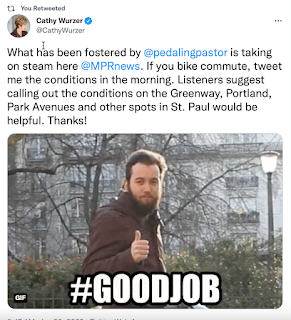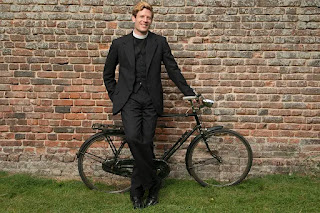Friday, January 21, 2022
Bike Commuting Reports: How Did They Come About
Sunday, January 2, 2022
Some Thoughts on WV and Sen. Manchin
This article first appeared in the Star Tribune, Jan. 1, 2022 as a Commentary.
Sen. Joe Manchin III, D-W.Va., has officially stated his opposition to President Joe Biden's Build Back Better plan. His opposition opened the floodgate for the usual vitriolic stereotypes against Appalachians, best expressed by Bette Midler when she tweeted: "He [Sen. Manchin] wants us all to be just like his state, West Virginia. Poor, illiterate and strung out."
I haven't lived in my home state of West Virginia since 2002. But every time someone asks me where I'm from (apparently, I still have an accent) and I tell them, I can see the same reaction expressed by Midler.
Nevertheless, I am proud of my West Virginia heritage, my love of Tudor's Biscuit World restaurants. I cheer for any sports team or athlete or cultural figure from West Virginia (from Kathy Mattea to Bill Withers, from Katherine Johnson Day to John Nash, from Randy Moss to Renee Montgomery).
America has a long history of extracting resources from Appalachia, not only coal, gas and wood, but men for wars. America loves to take from West Virginia and Appalachia but rarely gives back in the form of investment, love or respect.
True, West Virginia receives more from the federal government than it pays in taxes, but it's nowhere near enough to reverse the decades of neglect and underinvestment. And yet, West Virginia may provide the way to Build Back Better for living in a climate-changed world — with or without the support of Manchin.
Several years ago Bill McKibben spoke at the University of Minnesota as part of his "Do the Math" environmental justice tour. Near the beginning he said, "We don't need any more institutions too big to fail, we need communities so small they'll succeed."
Everywhere along my path of life — from Richmond, Va., to Rochester, N.Y., to Lincoln, R.I., to New Orleans, Los Angeles and Minneapolis, I have met West Virginian expats like me. And when I ask them what they miss most they all say, "the people."
We don't miss the xenophobia and homophobia, the abuse and addiction, the racism and misogyny that forced many of us to flee. But we miss the people, the hospitality, the smallness, the known-ness.
In every place I've lived outside of West Virginia, it is the rare opportunity when someone has invited me to their homes for dinner, onto their front porch for conversation or into their garage for a beer. It wasn't like that in West Virginia, and still isn't when we travel back. Growing up in my hometown of St. Albans I knew my neighbors and they knew me. I was often in the homes of my football coach, my Sunday school teacher, the ancient chair of the deacon board, and all of my friends and all of my neighbors.
I've lived for nine years in Minneapolis and I still do not even know most of the people on my block.
How can we ever move forward as a nation in a climate-changed world if we don't even know our neighbors? How can we be there for one another during climate, social and cultural catastrophes that are sure to come if we don't even know who to care for?
We had a glimpse of a different possibility during the first phase of closings and lockdowns during the pandemic. Overnight Americans stopped flying, worked from home and started cooking. It seemed everyone was making a sourdough starter or growing vegetables. Neighbors began talking to neighbors because they couldn't talk to anyone else.
I experienced this even more acutely outside of the building where the funeral for George Floyd took place. In the midst of public lamentation a Somali family passed out sambusas, white students from North Dakota drove a truck full of bottled water to give away, and a family from Venezuela handed out Popsicles from their cooler. As people sobbed, hugs were exchanged; as people screamed with righteous indignation, ears were listening.
It was the closest I had felt to West Virginia hospitality in years, but then it quickly faded.
Here we are at this moment acting as if the balance and future of the world depends on Sen. Manchin's vote of approval. We've ceded too much power to one man. We've turned him into an institution too big to fail.
What we need are communities so small we'll succeed. We can Build Back Better, West Virginia-style this holiday season, by investing our time and our attention in getting to know our neighbors, building social trust.
The naysayers will complain, "We haven't got time for that kind of slow work." But what good is a perfect plan if promoted by ignorant fools?
The slow work of community is the kind of work West Virginia has been giving witness to since June 20, 1863, when it became a separate state, rejecting slavery and secession during the Civil War.
Maybe now America will hold hands with West Virginia and Appalachia, not simply extract wealth from it and make fun of it.
All to say, we can build back better without Sen. Manchin's vote.



